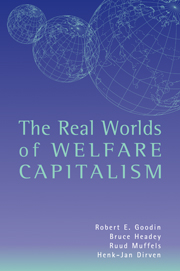Book contents
- Frontmatter
- Contents
- Preface
- Acknowledgments
- 1 Introduction
- Part I Setting the scene
- Part II One standard of success: external moral criteria
- 7 Promoting effciency
- 8 Reducing poverty
- 9 Promoting equality
- 10 Promoting integration
- 11 Promoting stability
- 12 Promoting autonomy
- Part III Another standard of success: internal institutional criteria
- Appendix tables
- References
- Index
11 - Promoting stability
Published online by Cambridge University Press: 22 September 2009
- Frontmatter
- Contents
- Preface
- Acknowledgments
- 1 Introduction
- Part I Setting the scene
- Part II One standard of success: external moral criteria
- 7 Promoting effciency
- 8 Reducing poverty
- 9 Promoting equality
- 10 Promoting integration
- 11 Promoting stability
- 12 Promoting autonomy
- Part III Another standard of success: internal institutional criteria
- Appendix tables
- References
- Index
Summary
People value security and stability in their lives, and they look to their governments to safeguard them in all sorts of ways. Many of the ways in which governments do so have little or nothing to do with social welfare policy. Defence and dikes contribute as much to the security and stability of people's lives as do old age pensions and unemployment insurance. Even within the distinctively social welfare realm, there are many more aspects to security and stability than are readily represented by data from panel studies primarily concerned with income dynamics.
Still, income stability is an undeniably important aspect of social stability. Furthermore, it is something which is uniquely well explored through panel data, which have heretofore been all too little utilized for that purpose. We will examine those issues, alongside a few more sociological ones, after a few brief remarks on the sorts of indicators we will be employing in this chapter.
Measurement issues
Some indicators of social instability are relatively simple and straightforward. We can get a perfectly good handle on some aspects of the phenomenon simply by counting the frequency of destabilizing events like divorce and unemployment. But for other purposes, particularly assessing income instability, something more complex than sheer frequency counts is required.
In this chapter we will employ two such measures of instability within a distribution (of employment or income or whatever). One of them is mathematically unassailable.
- Type
- Chapter
- Information
- The Real Worlds of Welfare Capitalism , pp. 197 - 210Publisher: Cambridge University PressPrint publication year: 1999



